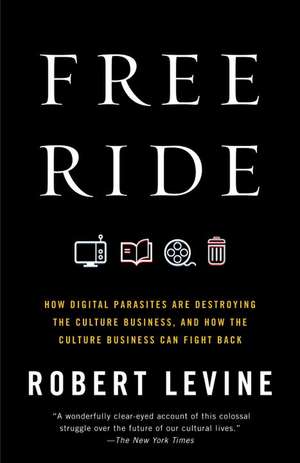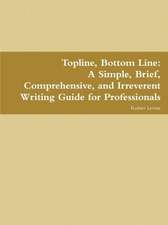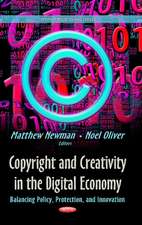Free Ride: How Digital Parasites Are Destroying the Culture Business, and How the Culture Business Can Fight Back
Autor Robert Levineen Limba Engleză Paperback – 17 sep 2012
On the Internet, “information wants to be free.” This memorable phrase shaped the online business model, but it is now driving the media companies on whom the digital industry feeds out of business. Today, newspaper stocks have fallen to all-time lows as papers are pressured to give away content, music sales have fallen by more than half since file sharing became common, TV ratings are plummeting as viewership migrates online, and publishers face off against Amazon over the price of digital books.
In Free Ride, Robert Levine narrates an epic tale of value destruction that moves from the corridors of Congress, where the law was passed that legalized YouTube, to the dorm room of Shawn Fanning, the founder of Napster; from the bargain-pricing dramas involving iTunes and Kindle to Google’s fateful decision to digitize first and ask questions later. Levine charts how the media industry lost control of its destiny and suggests innovative ways it can resist the pull of zero.
Fearless in its reporting and analysis, Free Ride is the business history of the decade and a much-needed call to action.
Preț: 85.98 lei
Nou
16.46€ • 16.96$ • 13.82£
Carte indisponibilă temporar
Specificații
ISBN-10: 0307739775
Pagini: 307
Dimensiuni: 133 x 203 x 17 mm
Greutate: 0.24 kg
Editura: Anchor Books
Notă biografică
Extras
In March 2007, the former Clinton administration official who helped shape the Internet as we know it finally admitted his policy hadn't worked.
Hunched over a tabletop microphone at a copyright conference hosted by McGill University in Montreal, Canada, Bruce Lehman talked about the effects of a law hated by most of the academics in his audience. As Clinton's commissioner of the United States Patent and Trademark Office, Lehman ran the National Information Infrastructure Task Force Working Group on Intellectual Property Rights. Assigned by the White House to set rules of the road for the emerging Internet, he championed policies that became the 1998 Digital Millennium Copyright Act, a law that was supposed to extend copyright to the online world without slowing its growth. Instead, it became a prime example of the law of unintended consequences.
"Unfortunately, at least in some areas, our policies haven't worked out too well," Lehman admitted, looking vaguely uncomfortable in a tan jacket and red tie. He put some of the blame on music and movie companies that didn't act quickly enough to develop new business models for the digital age. But considerable blame also goes to the law he helped design.
The Digital Millennium Copyright Act, a compromise between media conglomerates on the one hand and telecom companies on the other, devastated the first group and helped the second soar. As Lehman recommended, the law makes it illegal to circumvent copy-protection technology, such as the encryption on DVDs and some digital downloads, or distribute a tool to do so. It also gives "safe harbor" to Internet service providers and some online companies so they're not liable for copyright infringement based on the actions of users. That safe harbor made it easier for sites like YouTube to become valuable forums for amateur creativity. But it also let them build big businesses out of professional content they didn't pay for.
Until he started working on the Clinton administration's online policy, Lehman was best known as the first openly gay man to get a high-level government position through the Senate confirmation process. But his role as head of the patent office gave him significant authority. The top U.S. copyright official is the register of copyrights, who works in the Library of Congress, in the legislative branch of government. So Lehman emerged as the closest thing the executive branch had to a "copyright czar."
Many of the professors in Lehman's audience believed the law's "anticircumvention" provision interferes with free speech, since it makes it difficult to digitally copy music or movie scenes in order to remix or excerpt them for purposes of commentary. But Lehman was more upset that the music business was dying and other parts of the entertainment industry were facing similar problems, because the anticircumvention policy he pushed for didn't make up for the devastation caused by the safe harbor provision to which he reluctantly agreed.
Like most of the government officials he worked with in the Clinton administration, he thought digital technology would help the U.S. media business, not threaten to destroy it.
Although it might seem hard to believe now, there was a time when copyright law was of interest mostly to copyright lawyers. It's a complicated topic, intellectually abstract even to most attorneys. But as digital technology makes it faster and easier to copy music and movies, consumers are more inclined to wonder when exactly they're breaking the law.
The answers aren't always obvious. Duplicating a CD may or may not be legal, depending on the purpose of the copy. (DVDs, which have copy protection, are covered by the Digital Millennium Copyright Act.) Many other issues raised by new technology fall into a gray area, and the prohibitive cost of litigation tends to keep some of them there for a while.
In the United States, the Constitution gives Congress the authority "to promote the Progress of Science and useful Arts, by securing for limited Times to Authors and Inventors the exclusive Right to their respective Writings and Discoveries." Over the years, that definition grew to include film and music--first compositions, then recordings. And Congress repeatedly extended those "limited Times," from twenty-eight years to, in 1976, fifty years after the death of the author.
In the United States, copyright is primarily an economic instrument, a government-granted monopoly on the right to sell a work--for a limited time and with some exceptions. Until recently, the media business controlled its products by maintaining the exclusive right to copy them--hence, copyright. Depending on the nature of the work in question, this can include the right to reproduce, distribute, perform, and display it. When media was distributed physically--on paper or on disc--the first two mattered most and almost always overlapped.
To understand copyright as a monopoly, think of a performer like Bruce Springsteen, whose recordings are owned by Columbia Records under the terms of his recording contract, which assigns those rights to the label. In practical terms, Columbia has the exclusive right to sell his recordings. Since the market has only one legitimate supplier of Springsteen albums, the label can basically set its price. This monopoly is meant to compensate Columbia for investing in Springsteen, who in turn receives royalties as well as marketing and promotional support. Like any monopoly, copyright keeps the price of Springsteen albums higher than they otherwise would be, especially if they could be freely transferred online. But the monopoly is very narrow; it doesn't extend to rock anthems about New Jersey, or even to other artists' recordings of Springsteen's songs. And by allowing artists to make money on their work--either by selling it or by making an arrangement with a company that can--copyright gives them an incentive to produce more of it.
Although the logic behind copyright hasn't changed much, the laws themselves have always adjusted to new technologies, from piano rolls to cable television. Until relatively recently, most conflicts about copyright laws involved companies within, or at least close to, the businesses that depended on them. When songwriters wanted to make sure they received royalties when other performers recorded their compositions--a right they were granted in the Copyright Act of 1909--they faced off against another part of the music business. The opposing companies didn't challenge the thinking behind copyright, because their own businesses relied on it as well.
The copyright dispute that changed that--and set the stage for the battles over the online world--was Sony Corp. of America v. Universal City Studios Inc., sometimes called the Betamax case. In 1976, several movie studios sued Sony to establish that the company, which did not own a studio itself at the time, would have secondary liability for copyright infringement committed with its videocassette recorder. (Sony's Betamax was a proprietary technology that quickly lost market share to the VHS.) After eight years of legal battles, the Supreme Court essentially legalized the VCR in a 5-4 ruling that held Sony wasn't subject to liability on the grounds that the device was "capable of substantial non-infringing uses."
The Betamax case was the first major legal issue to set copyright holders against an industry with interests radically different from their own. Beneath all the overheated rhetoric--the Motion Picture Association of America's chief executive, Jack Valenti, famously said, "The VCR is to the American film producer and the American public as the Boston strangler is to the woman home alone"--the dispute had its roots in an economic conflict very much like the one that exists online today. Movie studios wanted to sell films in a format that couldn't also be used to copy them, such as the LaserDisc technology introduced in 1978. (Whether this could have succeeded in a market without the VCR is hard to know.) Electronics makers realized that consumers preferred--and might pay more for--a machine that could also record movies and television shows.
The Betamax case also shows why secondary liability is both important and controversial. No one disputed that it was illegal to duplicate a store-bought videocassette in order to sell copies, just as no one disputes the illegality of uploading an entire television show to YouTube today. But it's impractical, if not impossible, to police this kind of private behavior. So although neither Sony nor YouTube would commit direct copyright infringement, rights holders had an interest in holding them liable for secondary copyright infringement. In some cases, when a particular tool can be used for practically anything, this seems absurd: no one seriously suggests that carmakers should be liable if their vehicles are used in robberies. But it seems equally unrealistic to argue that a Web site called the Pirate Bay should have no responsibility whatsoever for the infringement it encourages. No auto manufacturer has ever marketed a product called the Getaway Car, complete with a device that switches license plates while the vehicle is in motion in order to evade police.
The Supreme Court's Betamax decision also complicated copyright by holding that "time-shifting"--recording broadcast television for later viewing--qualified as "fair use." The judicial doctrine of fair use provides an exception to copyright law to prevent it from placing undue limits on free speech. It allows journalists, scholars, and artists to quote or excerpt works in order to comment on them. (How much can be taken legally depends on the purpose and length of the excerpt, the nature of the work itself, and its effect on the work's value.) By deciding that it also applied to consumers' use of media, the Supreme Court opened up a range of issues that are still being debated today.
Although many anticopyright activists refer to fair use as a right, it's really an affirmative defense of copyright infringement--that is, one that acknowledges the act was committed but maintains that it's legal. "People who call it a right are just doing that to emphasize their politics," says David Nimmer, a UCLA Law School professor who with his father wrote Nimmer on Copyright, a treatise that has become the standard reference work on the subject for lawyers.
As soon as Lehman introduced the idea of an anticircumvention law in 1994, fair use became a rallying cry for activists who claimed that music and movie companies were trying to restrict it--along with free speech. If it became illegal to crack copy-protection systems, consumers wouldn't be able to make otherwise legal backup copies for personal use--a reasonable concern for $200 software packages but not really such a big deal for $15 DVDs. More important, some argued, it would be impossible to express ideas by remixing music or quoting text.
Courts have not agreed, since those who want to comment on a work using the work itself can retype a passage of text or record music on tape. When defendants who had distributed the code that unlocks DVDs argued that the Digital Millennium Copyright Act represented an unconstitutional restriction of fair use, the court rejected this as an "extravagant claim." "We know of no authority for the proposition that fair use, as protected by the Copyright Act, much less the Constitution, guarantees copying by the optimum method or in the identical format of the original." Desirable as it might be, convenience is not a right.
As with the Supreme Court's Betamax case, the debate over the Digital Millennium Copyright Act was an economic conflict dressed up in rhetoric about rights. On one side were the major labels and studios, at the height of their power and with good connections in the White House. On the other were electronics manufacturers, telecom companies, and Internet idealists--groups that hadn't yet worked together and didn't even seem to have much in common. But they would end up influencing the law just as much.
Recenzii
“A book that should change the debate about the future of culture….With this stylishly written and well-reported manifesto, Levine has become a leading voice on one side of our most hotly contested debate involving law and technology.”
—Jeffrey Rosen, The New York Times Book Review
"Turbo-reported....Free Ride is a timely and impressive book--part guilt trip, part wake-up call, and full of the kind of reporting that could only have been done with a book advance from an Old Media company."
—Businessweek
"[A] smart, caustic tour of the modern culture industry."
—Fortune
“Brilliant…A crash course in the existential problems facing the [media].”
—Richard Morrison, The Times
“The most convincing defense of the current predicament of the creative industries that I have read.”
—James Crabtree, Financial Times
“With penetrating analysis and insight, Levine, a former executive editor of Billboard magazine, dissects the current economic climate of the struggling American media companies caught in the powerful fiscal grip of the digital industry…. This incisive book is a start at an informed dialogue.”
—Publishers Weekly
“Can the culture business survive the digital age? That’s the burning question Robert Levine poses in his provocative new book. And his answer is one that will get your blood boiling. Rich with revealing stories and telling tales, Free Ride makes a lucid case that information is actually expensive – and that it’s only the big technology firms profiting most from the work of others that demand information be free.”
—Gary Rivlin, author of Broke, USA
“One of the great issues of the digital age is how people who create content will be able to make a living. Robert Levine’s timely and well-researched book provides a valuable look at how copyright protection was lost on the internet and offers suggestions about how it could be restored.”
—Walter Isaacson, President/CEO of the Aspen Institute and author of Benjamin Franklin
“This book thoroughly documents a wide-spread outbreak of cyber amnesia. Despite libertarian delusions, industries often get Free Rides, especially in their early days, but they eventually give back. Taxpayers build roads, then get hired to build cars. The Internet gives back a lot in exchange for its Free Ride, but one thing it defiantly isn’t giving back is a way for enough people to make a living. No matter how amusing or addictive the Internet becomes, its foundation will crumble unless it starts returning the favors it was given and still depends on.”
—Jaron Lanier, author of You Are Not a Gadget
“Free Ride is a brilliantly written book that exposes the dark side of the Internet. A must read for anyone interested in the horrific undermining of our intellectual culture.”
—Edward Jay Epstein, author of The Big Picture: Money and Power in Hollywood
“Robert Levine deftly dissects the self-serving Orwellian freedom-speak being served up by Silicon Valley’s digital new lords as they amass fortunes devaluing the work of artists, journalists and other old-fashioned ‘content creators.’ Free Ride begs us to remove our blinders and take a hard look down a cultural dead-end road.”
—Fred Goodman, author of Fortune’s Fool: Edgar Bronfman Jr., Warner Music, and an Industry in Crisis
“Without being a Luddite, Levine makes the phony digital media gurus of our day seem as simple-minded as their slogans.”
—Ron Rosenbaum, author of How the End Begins and Explaining Hitler
Descriere
'Information wants to be free' says influential technologist Stewart Brand at a 1984 hacker convention. These words became the mantra that shaped the Internet, and the conflict he predicted has led to a revolution in the way that our culture is funded and consumed. We have come to demand free content online, mistaking the packaging of physical products for what we were actually paying for- the creative content.
Newspapers are being pressurised to give their content away for free online; music sales have plummeted due to piracy; and Amazon is using its market power to drive down the price of ebooks. Technology companies are making millions from content created and funded by others, reducing the value of culture in the process. How did the media industry lose control over its destiny? What are the consequences? And are we headed for cultural meltdown if the media can't stop the free ride?















